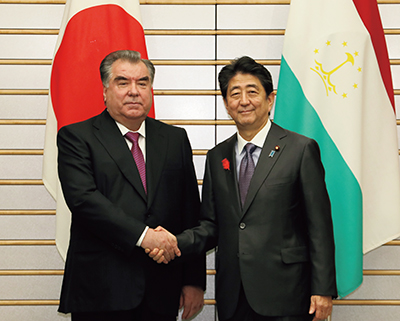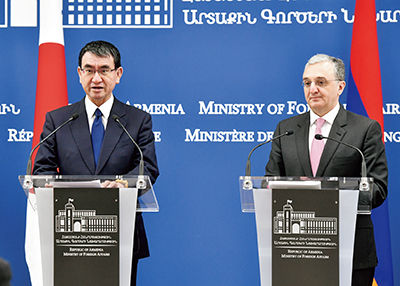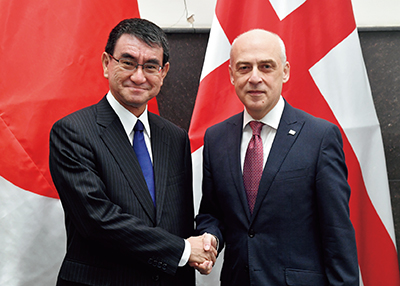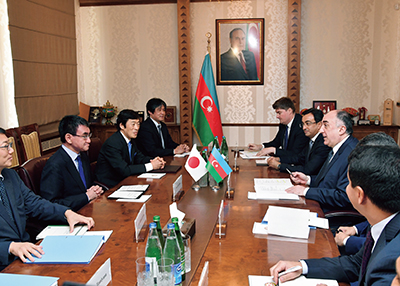Diplomatic Bluebook 2019
Chapter 2
Japan's Foreign Policy that Takes a Panoramic Perspective of the World Map
2 Central Asian and Caucasian Countries
(1) Overview
Countries in Central Asia and Caucasus are situated in a location of geopolitical importance that connects Asia, Europe, Russia and the Middle East, and have abundant natural resources such as oil, natural gas and uranium. Each country also has significant importance when seeking the stability of the region as a whole and addressing key challenges which the international community faces such as fighting against terrorism and countering illicit drugs.
Japan continues to work to strengthen bilateral ties with these countries through VIP visits, etc., and will be continuing initiatives to promote regional cooperation using the framework of the “Central Asia plus Japan” Dialogue, etc.
(2) Central Asian Countries
Japan supports the “open, stable and self-sustained development” of Central Asia, and is promoting diplomacy, which aims at contributing to the peace and stability of the region. The three pillars of Japan's diplomacy in Central Asia are as follows: (1) steadily strengthening of bilateral relationships; (2) encouraging regional cooperation and contribution to the common issues of the region through the “Central Asia plus Japan” Dialogue; and (3) cooperating in the global arena.
In 2018, following the previous year, active exchanges including VIP visits were carried out. From Central Asian countries, namely, First Deputy Chairman of the Senate of Uzbekistan Safaev visited Japan in September; President of Tajikistan Rahmon, Deputy Chairman of the Cabinet of Ministers and Minister of Foreign Affairs of Turkmenistan Meredov, Deputy Prime Minister and Chairman of the State Committee for Investments of Uzbekistan Kholmuradov and Minister of Foreign Trade of Uzbekistan Khodjaev visited in October; and Deputy Speaker of the Legislative Chamber of Uzbekistan Alihanov visited in December, among others.
 Japan-Tajikistan Summit Meeting (October 5, Tokyo; Photo: Cabinet Public Relations Office)
Japan-Tajikistan Summit Meeting (October 5, Tokyo; Photo: Cabinet Public Relations Office)President of Tajikistan Rahmon visited Japan for the first time in around 11 years. He visited Hiroshima and Kyoto as well as held a summit meeting with Prime Minister Abe. At the summit meeting, the leaders confirmed their willingness to cooperate in the area of human resources development, as well as border control in Tajikistan-Afghanistan border and strengthening bilateral economic relations.
Deputy Prime Minister and Chairman of the State Committee for Investments of Uzbekistan Kholmuradov and Minister of Foreign Trade of Uzbekistan Khodjaev held discussions with Deputy Prime Minister and Minister of Finance Aso, State Minister for Foreign Affairs Abe, and others and attended a meeting of the Japan-Uzbekistan Economic Committee. Deputy Chairman of the Cabinet of Ministers and Minister of Foreign Affairs of Turkmenistan Meredov paid a courtesy call on Prime Minister Abe and held talks with Foreign Minister Kono. On the occasion of such VIP visits to Japan, documents pertaining to cooperation projects with Japanese companies were also prepared.
From Japan, State Minister for Foreign Affairs Nakane visited Uzbekistan in July and held meetings with Deputy Prime Minister and Chairman of the State Committee for Investments Kholmuradov and other government dignitaries. In December, Parliamentary Vice-Minister for Foreign Affairs Yamada visited the Kyrgyz Republic and held a meeting with Minister of Foreign Affairs Aidarbekov.
From the perspective that regional cooperation for resolving common regional issues is essential for the stability and development of Central Asia, in 2014, Japan launched the “Central Asia plus Japan” Dialogue to promote regional cooperation as a catalyst. Under this framework, six Foreign Ministers' Meetings have been held so far, along with a range of discussions involving experts and members of the business community. More than a decade since its establishment, the framework of recent years has become a forum to discuss more practical cooperation beyond dialogue among participants. The 12th Senior Officials Meeting (SOM) was held in January, which decided to make tourism a new theme of cooperation. This was followed by the fourth Experts' Meeting on tourism held in February. The second business dialogue held in March was participated by more than 100 representatives from Japanese companies and economic organizations. Furthermore, the 11th Tokyo Dialogue (Intellectual Dialogue) entitled “Strategic Outlook on Regional Cooperation and Regional Security in Central Asia” was held in July, and the 13th SOM was held in November.
2018 marked 20 years since the demise of former Associate Professor of Tsukuba University Yutaka Akino in Tajikistan, who was dispatched to the UN Mission of Observers in Tajikistan (UNMOT) as a political officer. In July, a symposium was held in Tokyo, in the presence of Foreign Minister Kono, which took a look back at the achievements made by Dr. Akino as an academic and discussed what role Japan should play in the area of peacebuilding and international contribution. In Tajikistan, another symposium was held and awards were granted to those who have contributed to the maintenance and management of the memorial for the UNMOT personnel who lost their lives.
In Central Asia, it is noteworthy that cooperative relations deepened among the countries in the region. The first Central Asian Summit Meeting was held in Kazakhstan in March. Other examples are the increase in reciprocal visits by the leaders of each country, the reopening of border checkpoints and resumption of direct flights. In August, a Caspian Summit Meeting was held in Kazakhstan, and documents including an agreement on the legal status of the Caspian Sea were signed by the five coastal countries (Kazakhstan, Russia, Turkmenistan, Iran and Azerbaijan).
(3) Caucasus Countries
2018 was a groundbreaking year for relations between Japan and Caucasus countries.
From Japan, Foreign Minister Kono visited the three Caucasus countries of Armenia, Georgia and Azerbaijan in September, and paid courtesy calls on the leaders and held Foreign Ministers' Meetings. It was the first time in history for a Japanese Foreign Minister to pay visits to Armenia and Georgia. The visit to Azerbaijan was the first time in 19 years since Foreign Minister Komura made a visit in 1999.
 Japan-Armenia Foreign Ministers' Meeting (September 3, Yerevan, Armenia)
Japan-Armenia Foreign Ministers' Meeting (September 3, Yerevan, Armenia) Japan-Georgia Foreign Ministers' Meeting (September 4, Tbilisi, Georgia)
Japan-Georgia Foreign Ministers' Meeting (September 4, Tbilisi, Georgia) Japan-Azerbaijan Foreign Ministers' Meeting (September 5, Baku, Azerbaijan)
Japan-Azerbaijan Foreign Ministers' Meeting (September 5, Baku, Azerbaijan)In Caucasus countries, there still exist disputes over South Ossetia and Abkhazia in Georgia and over the Nagorno-Karabakh between Armenia and Azerbaijan. At the same time, this region has potential to be a gateway connecting Asia, Europe and the Middle East and strategic importance that directly affects the peace and stability of the international community. During Foreign Minister Kono's visit to the Caucasus countries, he announced the Caucasus Initiative, the basic policy of Japan's diplomacy for this region which is comprised of two pillars: (1) assistance for human resources development of architects for state building (human resources development); and (2) assistance for paving the way to “appealing Caucasus” (infrastructure development and business environment improvement).
In Azerbaijan, a presidential election was held in April, and President Aliyev was reelected. In May, Parliamentary Vice-Minister of Economy, Trade and Industry Hiraki visited Azerbaijan to attend an International Caspian Oil & Gas Exhibition and Conference.
A signing ceremony for the Japan-Armenia Investment Agreement was held in February. In the same month, Parliamentary Vice-Minister for Foreign Affairs Manabu Horii visited Armenia and held a meeting with Minister of Foreign Affairs Nalbandian. In May, a large-scale protest took place against the accession of former President Sargsyan to Prime Minister. Without any violent suppression by the government, Prime Minister Sargsyan resigned and Mr. Pashinyan who was a member of the National Assembly that led the opposition was elected Prime Minister.
In Georgia, a presidential election was held in October. Parliament member Zourabichvili was elected in the final voting in November and was appointed President.
